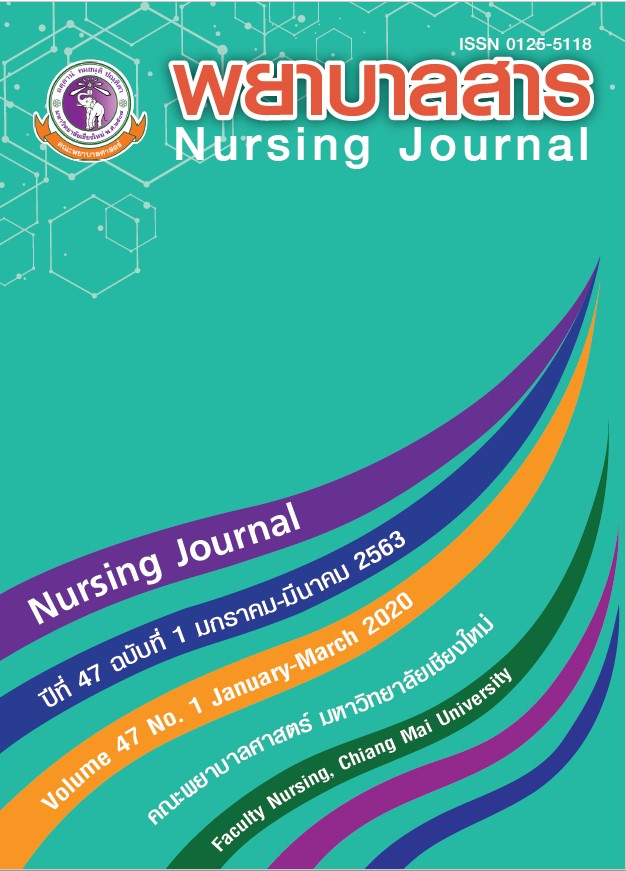The Management of Menopausal Symptoms
Keywords:
Management, Menopausal symptomsAbstract
Golden age is the period of life that women cannot avoid. Women of reproductive age in general, the body produces sex hormones called estrogen, which acts as a sexual development from girls as young women and its play a role with other hormones to control the cycle of menstruation and pregnancy. But when entering the golden age, the endocrine function of reproductive system decreases, resulting in changes in the structure and function of the body. And various symptoms that disturbs feelings and the mind as a result of reduced sex hormones. Such menopausal symptoms may result in discomfort and affect the quality of life of postmenopausal women until the elderly. Menopause will cause health problems or not, depending on the fertility and health of women. Including preparation for dealing with change. Seek to deal with adverse reactions that may occur, including self-care, such as food care, regular exercise, vaginal muscle exercise, mental health promotion activities, support from family and society, and the use of hormone replacement drugs. The management of these menopausal symptoms is to alleviate the discomfort that affects the lives of menopause women. Which was a period of success in both the family institution and the work of most women.
References
Anek, A. (2010). Effects of circuit box jumping on bone resorption, health-related physical fitnessand balance in premenopausal women (Master’s thesis, Chulalongkorn University). (In Thai).
Bureau of Health Promotion, Department of Health (2016). Guidelines for training of publichealth personnel in health promotion for the golden age population. Bangkok: Ministry of Public Health. (In Thai).
Crowther, P. (2019). What Every Woman Ought to Know about the Menopause. Retrieved from http://search.ebscohost.com
Edwards, D., & Panay, N. (2016) Treating vulvovaginal atrophy/genitourinary syndrome of Menopause: How important is vaginal lubricant and moisturizer composition. Climacteric, 19 (2),151-161.
Jantima, P., & Sritaratikul, S. (2017). The Effect of Promoting Self-management for Health Behavior Modification of Metabolic Syndrome Risk Group. Nursing Journal, 44 (2), 162-171. (In Thai)
Lichtman, R. (1991). Perimenopausal hormone replacement therapy. Journal of Nurse-Midwifery, 36 (1), 30-48.
Limpaphayom, K., & Chaikittisilpa, S. (2000). Changes in the urinary system and reproductive organs. In Limpaphayom, K. (Ed.), Menopause (pp. 53-57). Bangkok: Department of Obstetrics-Gynecology, Faculty of Medicine Chulalongkorn Univer sity. (In Thai).
Martin, V.T., Pavlovic, J., Fanning, K. M., Buse, D. C., Reed, M. L., & Lipton, R. B. (2016). Perimenopause and menopause are associated with high frequency headache in women with migraine: results of the American migraine prevalence and prevention study. Headache, 56(2), 292-305.
Nakornchai, S. (1997). Physiology and pharmacology of sex hormo nes in menopause. In Chindavijak, B. & Chulavatnatol, S. (Eds.), Female and male golden age health problems(pp. 1-20). Bangkok: Faculty of Pharmacy Mahidol University. (I n Thai).
Ngowsiri, K. (2013). The effects of holistic health promotion program on quality of life in periand postmenopausal women. (Doctoral dissertation, Chulalongkorn University). (In Thai).
Nutrition Division, Department of Health, Ministry of Public He alth. (2015). Food for menopausalwomen. Retrieved from http://nutrition.anamai.moph.go.th. (In Thai).
Peng, W., Adams, J., Hickman, L., & Sibbritt, D. (2016). Longitudinal analysis of associations between women’s consultations with complementary and alternativ e medicine practitioners/use of self-prescribed complementary and alternat ive medicine and menopause-related symptoms, 2007-2010. Menopause, 23 (1), 74-80.
Phillips, N. A. & Rosen, R. C. (1999). Menopause and sexuality . In R. A. Lobo (Ed.), Treatment ofthe postmenopausal women: Basic and clinical aspects (2 nd ed., pp. 437-443).
Philadelphia: J. B. Lippincott.Pongsatha, S. (2011). Menopause. Retrieved from http://www.med.cmu.ac.th. (In Thai).
Potaros, D. (1998). Lacking me (Menstruation) then you will fee l. The Journal of Faculty of Nursing Burapha University, 5 (2), 35-45. (In Thai).
Soontarpa, S. (2011). Guidelines for health care for menopausal women Department of Obstetrics and Gynecology Faculty of Medicine Khonkaen Universi ty. Srinagarind MedicalJournal, 16 (Special ed.), 267-275. (In Thai).
Soontarpa, S. (2014). Golden age women. Srinagarind Medical Journal, 29, 50-55. (In Thai).
Srisukho, C. (2018). Golden age (6 th ed.). Bangkok: amarinhealth. (In Thai).
Sun, D., Shao, H., Li, C., & Tao, M. (2014). Sleep disturbance and correlates in menopausal women in Shanghai, Journal Psychosomatic Research, 76(3), 237-41.
Thavichachart, N., & Suppapitiporn, S. (2000). Psycho-social conditions in menopause. Nursing Journal, 47 (1), 478-488.
Yang, C. F., Kenney, N. J., Chang, T. C., & Chang, S. R. (2016). Sex life and role identity in Taiwanese women during menopause: a qualitative study. Journal of Advanced Nursing, 72 (4), 770-781.
Downloads
Published
How to Cite
Issue
Section
License
บทความที่ได้รับการตีพิมพ์เป็นลิขสิทธิ์ของวารสารพยาบาลสาร
ข้อความที่ปรากฏในบทความแต่ละเรื่องในวารสารวิชาการเล่มนี้เป็นความคิดเห็นส่วนตัวของผู้เขียนแต่ละท่านไม่เกี่ยวข้องกับมหาวิทยาลัยเชียงใหม่ และคณาจารย์ท่านอื่นๆในมหาวิทยาลัยฯ แต่อย่างใด ความรับผิดชอบองค์ประกอบทั้งหมดของบทความแต่ละเรื่องเป็นของผู้เขียนแต่ละท่าน หากมีความผิดพลาดใด ๆ ผู้เขียนแต่ละท่านจะรับผิดชอบบทความของตนเองแต่ผู้เดียว






